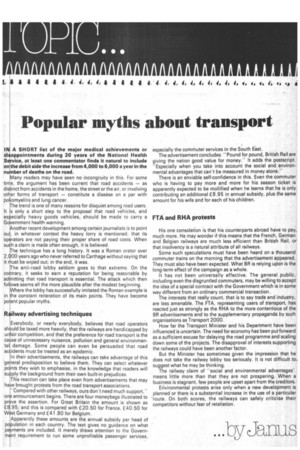Popular myths about transport
Page 59

If you've noticed an error in this article please click here to report it so we can fix it.
IN A SHORT list of the major medical achievements or di appointments during 30 years of the National Health S rvice, at least one commentator finds it natural to include on the debit side the increase from 4,000 10 6,000 a year in the nu her of deaths on the road.
any readers may have seen no incongruity in this. For some ti e, the argument has been current that road accidents — as dis inct from accidents in the home, the street or the air, or involving ot er forms of transport — constitute a disease on a par with pa iomyelitis and lung cancer.
he trend is one of many reasons for disquiet among road users. It s only a short step to the proposal that road vehicles, and es ecially heavy goods vehicles, should be made to carry a G. ernment health warning.
nother recent development among certain journalists is to point ou , in whatever context the heavy lorry is mentioned, that its op rators are not paying their proper share of road costs. When su h a claim is made often enough, it is believed.
he technique has a long history. It was a Roman orator over 2,1100 years ago who never referred to Carthage without saying that it ust be wiped out; in the end, it was.
he anti-road lobby seldom goes to that extreme. On the co trary, it seeks to earn a reputation for being reasonable by ad itting that road transport is essential. The attack which then fol ows seems all the more plausible after the modest beginning. here the lobby has successfully imitated the Roman example is in he constant reiteration of its main points. They have become pa ent popular myths.
R ilway advertising techniques
Everybody, or nearly everybody, believes that road operators sh uld be taxed more heavily, that the railways are handicapped by un air competition, and that the preference for road transport is the ca se of unnecessary nuisance, pollution and general environmental damage. Some people can even be persuaded that road ac idents must be treated as an epidemic.
In their advertisements, the railways can take advantage of this ge eral predisposition to believe them. They can select whatever pa nts they wish to emphasise, in the knowledge that readers will su ply the background from their own built-in prejudices.
This reaction can take place even from advertisements that may ha e brought protests from the road transport associations.
-Compared with other railways, ours don't need much support," on announcement begins. There are four moneybags illustrated to priive the assertion. For Great Britain the amount is shown as £: .95; and this is compared with £20.50 for France, £40.50 for W st Germany and £41.80 for Belgium.
jApparently these amounts are the annual subsidy per head of polpulation in each country. The text gives no guidance on what pa mems are included. It merely draws attention to the Governm nt requirement to run some unprofitable passenger services, especially the commuter services in the South East. The advertisement concludes "Pound for pound, British Rail are giving the nation good value for money." It adds the postscript. "Especially when you take into account the social and environmental advantages that can't be measured in money alone." There is an enviable self-confidence in this. Even the commuter who is having to pay more and more for his season ticket is apparently expected to be mollified when he learns that he is only contributing an additional £8.95 in annual subsidy, plus the same amount for his wife and for each of his children.
FTA and RHA protests
His one consolation is that his counterparts abroad have to pay, much more. He may wonder if this means that the French, German and Belgian railways are much less efficient than British Rail, or that insolvency is a natural attribute of all railways.
Some such speculations must have been heard on a thousand commuter trains on the morning that the advertisement appeared. They must also have been expected. What BR is relying upon is the long-term effect of the campaign as a whole.
It has not been universally effective. The general public, including even the disgruntled commuters, may be willing to accept the idea of a special contract with the Government which is in some way different from an ordinary commercial transaction.
The interests that really count, that is to say trade and industry, are less amenable. The ETA, representing users of transport, has reacted just as strongly as the R HA to the more contentious of the BR advertisements and to the supplementary propaganda by such organisations as Transport 2000.
How far the Transport Minister and his Department have been influenced is uncertain. The need for economy has been put forward as a sufficient excuse for delaying the road programme and scaling down some of the projects. The disapproval of interests supporting the railways could have been another factor.
But the Minister has sometimes given the impression that he does not take the railway lobby too seriously. It is not difficult to. suggest what he maybe thinking.
The railway claim of "social and environmental advantages' means little more than that they are not prospering. When a business is stagnant, few people are upset apart from the creditors. Environmental protests arise only when a new development is planned or there is a substantial increase in the use of a particular 'route. On both scores, the railways can safely criticise their competitors without fear of retaliation.




































































































